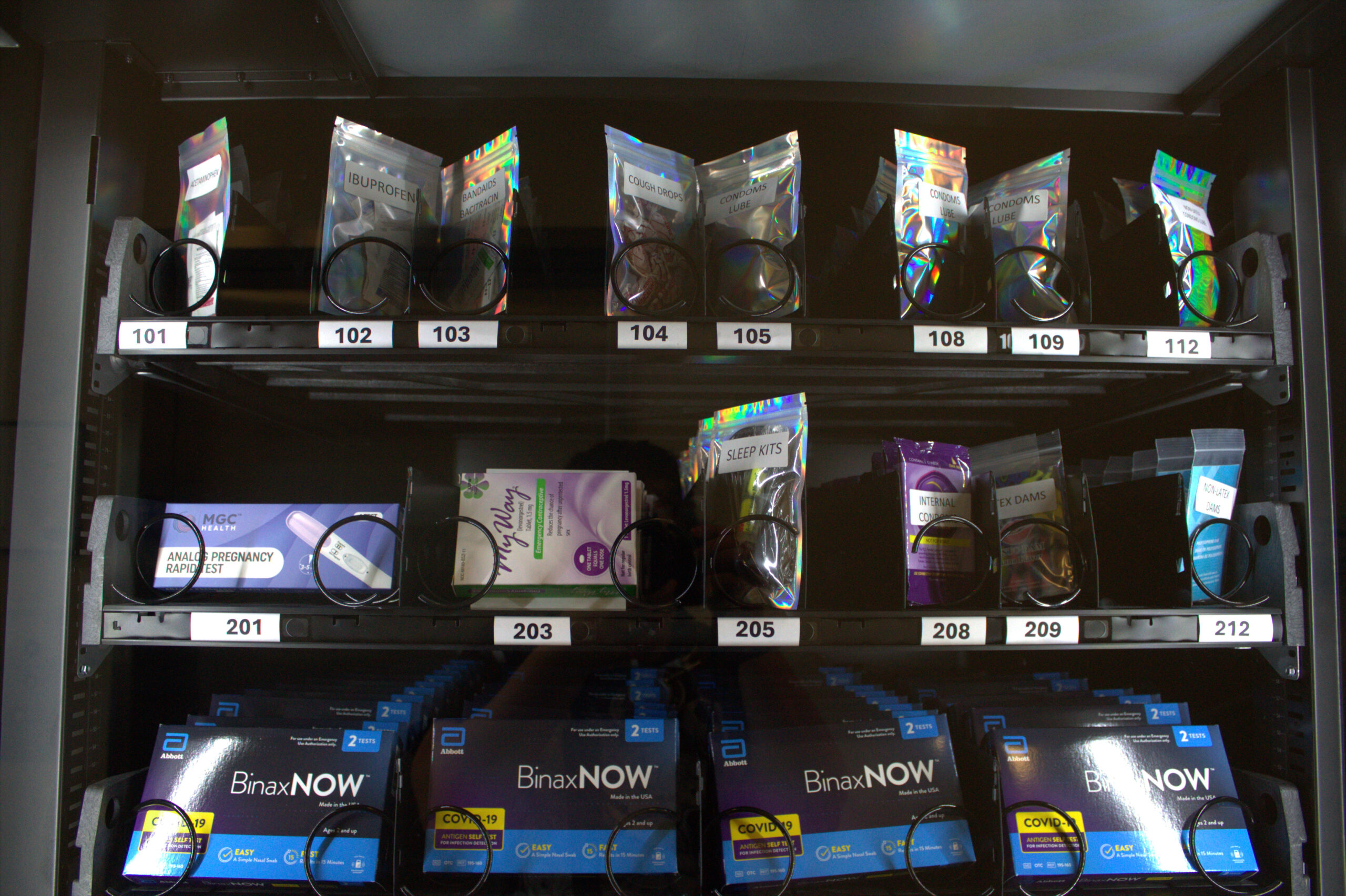Plan B vending machine opens at Health Center
September 13, 2024
 Lillian Frank
Lillian FrankIn Maine, the emergency contraceptive Plan B can be purchased over the counter at most pharmacies. But until this semester, Bowdoin students seeking the drug on campus could only access it by making an appointment at Health Services and meeting face-to-face with a provider.
“[It’s] a very non-private way to get the health care that you need,” Bowdoin Reproductive Justice Coalition (BRJC) member Liz Bouchard ’26 said.
BRJC and Health Services unveiled this month their joint solution to the problem: a Plan B vending machine at the Health Center free to all students and available 24 hours per day.
The machine stocks the My Way brand of emergency contraceptive, as well as pregnancy tests, condoms and personal lubricant. Students can also access Covid-19 test kits, ibuprofen and acetaminophen. According to Health Services, the machine is the first of its kind to be implemented in the state since the Maine legislature permitted the vending machine sale of nonprescription medications in 2019.
Bouchard, who is pursuing a double major in biochemistry and gender, sexuality and women’s studies, spearheaded the project on behalf of BRJC. She decided to pursue the project after hearing about the University of Southern Maine, where students can request Plan B any time through an anonymous Google Form and retrieve it from a fellow student. She said she wanted to emulate the program’s ease of access and privacy—qualities she felt Plan B access at the College was lacking.
“When we heard about that, we thought immediately about what it looks like at Bowdoin,” she said.
She worked closely with Director of Health Services Christine Mahoney, who had her own aspirations to increase around-the-clock reproductive healthcare access before the two connected. For Mahoney, the vending machine is a way for students to take charge of their healthcare swiftly and without shame.
“There are a lot of people who would find a barrier in having to make an appointment or even having to say out loud, ‘I need Plan B,’” Mahoney said.
Mahoney helped the College acquire a license for the machine, which is the repurposed Covid test kit vending machine previously located in the lower lobby of Smith Union. An anonymous alum donated the funding needed to retrofit the machine’s internal hardware for dispensing new items.
Mahoney and Bouchard said relocating the machine from Smith Union to the third floor of Buck was an important privacy measure.
“This felt like a more private spot,” she said.
Since students must swipe their OneCard to access, BRJC and Health Services also had concerns about the traceability of students’ personal information. The organizations worked with the OneCard office to ensure that student information would not be compromised. Mahoney explained that while a student’s visit to the vending machine will be recorded when they swipe their OneCard, their specific item selections will not be.
“They can trace that a student used the vending machine, [but] they can’t trace what products were used,” Mahoney said.
For BRJC, the vending machine initiative is just one step in a long journey toward expanding access to reproductive care at the College and elsewhere. Bouchard said the group hopes to launch a website in collaboration with the Health Center that catalogs the resources and information available to students. She is also interested in partnering with Colby and Bates to help those schools jumpstart similar programs.
“We had a successful movement, and now we’re trying to get a lot of publicity around it so that students know,” Bouchard said.
Mahoney said that access to reproductive healthcare tools like Plan B mitigates the trickle-down effects of unplanned pregnancies, such as economic instability and reduced access to education. She hopes to expand Health Services’s offerings to include medication abortions and reversible contraception methods, like intrauterine devices (IUDs) and the Nexplanon arm implant, all of which are available at some other institutions.
Mahoney said that robust reproductive health services enable people to be part of society—and part of the College.
“It’s all about access,” she said.
Editors’ note on September 15 at 3:30 p.m.: At the time of publication, OneCard permissions had not yet been changed to provide students 24-hour access to the Health Center. This article has been updated to reflect that students can now access the Plan B vending machine 24 hours a day.

Comments
Before submitting a comment, please review our comment policy. Some key points from the policy: